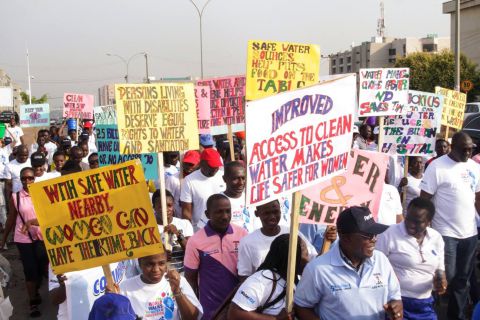Writing from Stockholm World Water Week, Hanna Woodburn, Acting Secretariat Director for the Global Public-Private Partnership for Handwashing (PPPHW) talks about the critical need and importantce of partnerships to achieve change in the post-2015 development framework.

Collaboration. Like integration, collaboration is a buzzword that I’ve heard frequently this week. As a public-private partnership, we encourage collaboration across stakeholder groups, in support of major events, such as Global Handwashing Day, and in project implementation. Partnership isn’t only in our name, it is central to the work that we both undertake and promote.
As a promoter of partnerships, I have been challenged to think of them in new ways this week. In particular, what has struck me is the important role that partnerships will play in operationalizing the Sustainable Development Goals. Improving water, sanitation, and hygiene is not only extremely cost effective, but also impactful on fighting major causes of child mortality. Nonetheless, a financial investment will be required to bring the SDG vision to life. Strategic partnerships that leverage the expertise and resources of individuals and organizations from a range of backgrounds will be critical in helping to achieve these goals.
I am certainly not the only one at Stockholm World Water Week working in, promoting, and contemplating partnerships. As such, I thought it fitting to get the input from some of my colleagues to hear their perspectives.
Jordan Teague from WASH Advocates takes a practical approach to partnerships, especially as we move into the post-2015 era. “In order to achieve the goal of universal coverage and service delivery we will need to coordinate, partner, and learn from each other. Rather than working in silos, on our own programs and approaches, all of us—implementers, government, and service providers—need to work together to reach total and sustainable coverage.”
Likewise, Megan MacGarry with End Water Poverty acknowledges that it is only through partnerships that End Water Poverty, a global civil society coalition can achieve change. “This is because we feel that the key way to ensure success in the post-2015 development framework is to work together, at all levels. United, we are stronger. By working together, within the WASH sector, but importantly across all sectors, and with a range of stakeholders, we can maximize our impact, and ensure a global demand for universal access to sustainable water, sanitation and hygiene for all. By having a strong united voice, we can ensure that the promises of today, result in a better future. Together, we can end the water and sanitation crisis.”
Additionally, collaboration and partnerships can foster shared learning and mutual accountability. The WASH sector has a great challenge ahead of it if we are truly to reach universal WASH coverage by 2030, but through collaboration we can amplify our individual efforts to make as big an impact as possible.

Together we can achieve change and end the water and sanitation crisis. Unite for a better future!